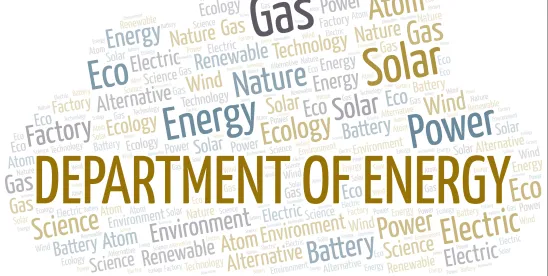Introduction
Coming on the heels of its June 2025 announcement establishing a pilot program for reactor construction and operation in accordance with President Trump’s Executive Order 14301, on July 16, 2025 the DOE announced a Fuel Line Pilot Program designed to develop or build fuel production lines using DOE authorization, in order to increase production capacity in support of the reactors built and constructed pursuant to EO 14301. If you participate in any aspect of the nuclear fuel supply chain – including mining and milling, conversion, enrichment, transport, or storage — here is what you need to know now:
What is the Fuel Line Pilot Program designed to do? According to the Request for Application (RFA) the DOE issued on July 15, “the purpose of constructing and operating reactors [authorized by EO 14301] is to establish fundamental technological viability under DOE’s authority to foster research and development in nuclear reactors . . . .” As a result, “[the] advanced nuclear fuel lines [authorized under the Fuel Line Pilot Program will] support the deployment of advanced nuclear reactors” authorized under EO 14301.
On what Authority is DOE relying for the Program? The DOE has previously determined that under the Atomic Energy Act’s (AEA) authorization of reactors under DOE’s sufficient control, the reactors to be authorized under EO 14301 will be “under contract with and for the account of” the DOE, pursuant to 42 U.S.C. § 2140. Thus, according to the RFA, “To support this effort, additional nuclear facility (i.e. fuel fabrication) resources will be needed. Accordingly, DOE is relying on this same authority for this aspect of the pilot program to develop or build fuel production lines to increase production capacity.” [RFA, p. 2]. Accordingly, facilities built and operated under the Program will not require Nuclear Regulatory Commission (NRC) licensing. [RFA, p. 3]. Any DOE-approved fuel lines developed under the Program will be fast tracked for future NRC licensing. [RFA, p. 3].
What are the benefits of proceeding under the Program? DOE believes Program participants will benefit in two key ways: “DOE authorization will (1) unlock the next level of private funding; and (2) provide a fast track to an NRC license, and hence, commercialization for authorized fuel fabrication lines. See Section 4(d) of EO 14300 (NRC Reform).” [RFA, p. 4]. However, this is not a grant or loan program. In fact, “If selected, the Applicant will be responsible for the costs associated with designing, manufacturing, constructing, operating and decommissioning the advanced nuclear fuel line.” [RFA, p. 4].
Who is eligible to Apply? The Program is open to: 1) US domestic entities with majority domestic ownership and a physical location for business operations in the US, or 2) US domestic entities with a physical US location for business operations that are not majority domestically owned, but which submit an explicit waiver request for foreign entity participation at the time of application. [RFA, p. 7]. Additionally, the Program contains certain thresholds for an “acceptable advanced nuclear fuel line” that might exclude many entities not already operating in this space. Specifically, those thresholds are:
- “Sufficiently mature design to support imminent development and submittal of safety basis documentation, including a final preliminary documented safety analysis within the required time period to support operations;
- Established fuel fabrication plans to utilize a qualified fuel form, and has identified nuclear fuel feedstock which will support reactor fuel needs for a Qualified Test Reactor;
- Adequate financial resources and mature supply chain to complete design, build, commissioning, operation, and decommissioning, as appropriate; [and]
- Execution readiness includes procurement/manufacture of all fuel line materials, systems and components, and qualified staffing to support all project phases.”
[RFA, pp. 3-4].
What will DOE expect to receive from Program Participants? Of course, creating additional fuel sources for reactors authorized under EO 14301 is the primary goal for DOE of the Fuel Line Pilot Program. Additionally, pursuant to the RFA, “Applicants may need to grant DOE a perpetual, non-assignable license for specific uses of novel data, technical, financial or otherwise, generated during the course of the project. DOE may utilize such data to support its efforts for future research reactor authorization and safety case justifications. Licensed data may include, but are not limited to, data associated with authorization of nuclear fuel fabrication equipment and particular operational data.” [RFA, p.6]. Notably, however, “DOE is not seeking to obtain legal rights to any intellectual property such as title to inventions, copyrighted works, or software arising out of this project aside from particular data arising out of the project. . . .” [RFA, p.3].
How will Program participants be selected? Section G of the RFA discusses application review and evaluation. Key takeaways are:
- DOE will evaluate applications to determine based on merit which applications meet the qualifications;
- DOE “reserves the right to select all, some, or none of the applications received”;
- There is no maximum number of qualified applications; and
- DOE will prioritize projects based on the quality of the proposed project, as well as applications received by the initial application deadline.
[RFA, p. 12].
What are the key deadlines? The RFA sets out a July 23, 2025 deadline for potential applicants to submit questions, and an August 15, 2025 deadline for submission of applications. [RFA cover]. After that deadline, “applications may be submitted at any time and will be reviewed periodically for selection as soon as reasonably possible.” [RFA cover]. Finally, “DOE anticipates announcing initial selections of participants within 30 days after receipt of proposal. DOE may announce further selections of participants on a rolling basis after that date.” [Id.]
About Foley’s Energy & Infrastructure Sector
Foley’s cross-disciplinary Energy & Infrastructure team of more than 200 attorneys regularly represents clients in the traditional and renewable power, oil & gas, nuclear, and infrastructure and energy transition industries. Foley offers comprehensive legal services for nuclear energy companies and projects to guide clients through every phase – from development and site control to investment, commercial contracting and financing. Foley can also assist companies involved in the nuclear fuel supply chain – including mining, manufacturing, and disposal – to navigate the various state and federal regulations, international agreements, and national security considerations.




 />i
/>i
